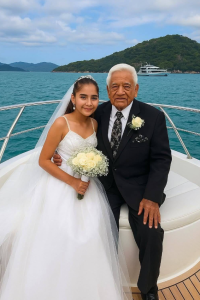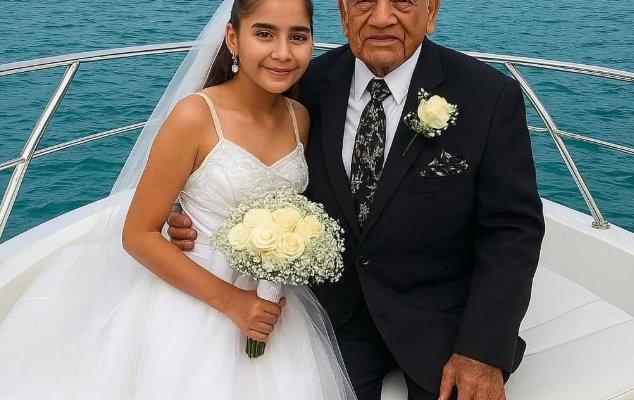Title: “Ten Days After ‘I Do’”
At just 21, Amara Taylor had already lived a lifetime of hardship. Born in a forgotten corner of rural Mississippi, raised in a shack with no running water and a roof that leaked every spring, she had known struggle like an old friend. Her mother passed when she was 12. Her father left before she was born. For years, her only dream was survival.
When Mr. Harold Whitmore appeared in her life, he was nothing like the boys she knew. He wasn’t reckless, broke, or chasing the next hustle. He was 70 years old, wealthy, and oddly gentle. He owned three businesses, five properties, and a house so quiet you could hear your own thoughts echo. He met Amara at a roadside café where she waited tables, barely making enough to pay rent. He left her a $200 tip and returned the next day to ask about her dreams.
“No one’s ever asked me that before,” she had said.
They talked. Then they talked again. Weeks passed, and soon he was picking her up in his car, teaching her how to cook gourmet meals, buying her clothes that didn’t have holes in them. And just three months later, he proposed.
Everyone judged her.
“She just wants his money.”
“That poor old man is being played.”
“It won’t last.”
But Amara surprised them. She didn’t seem interested in the money. She still drove her old car. She still wore her worn-down sneakers. And Harold — he looked happier than he had in decades.
On a warm Friday morning in June, with no guests but a justice of the peace and two witnesses, they got married in Harold’s garden, beneath the weeping willow she’d always loved.
Amara whispered, “Thank you for saving me.”
Harold replied, “No, my dear. You saved me.”
But Then Came Day 10
Ten days after the wedding, Amara woke to an empty bed. Harold was always up early, but this morning the house felt different. Quiet. Still.
She walked into the kitchen. No coffee brewing. No newspaper on the table.
“Harold?” she called.
Silence.
She walked into his office — a room she’d never stepped into before. He had always kept the door locked, saying it was “too messy” for her.
But today… the door was open.
Amara hesitated, then stepped inside.
It was spotless. Not a paper out of place. But what drew her attention was a single manila folder resting neatly on the desk. Her name was handwritten across the front.
She picked it up with trembling hands.
Inside, she found legal documents. A new will. A deed transfer. Insurance paperwork.
And then, at the bottom, a letter addressed to her.
The Letter
My sweet Amara,
If you are reading this, then I’m no longer with you. I didn’t tell you I was sick — not because I didn’t trust you, but because I didn’t want your heart to carry a burden you didn’t choose.
Three months ago, I was told I have late-stage pancreatic cancer. The doctors gave me no more than a few weeks. But then, I met you.
You reminded me of who I used to be. Brave. Scrappy. Full of fire. Loving you gave me peace in my final days. That is a gift I could never repay.
But I have tried.
As of today, everything I own — my home, my business shares, my accounts — are yours. Not because I pity you, but because I believe in you.
Build something better than what the world gave you. And don’t let anyone shame you for how we met. You gave me life again. I hope I gave you freedom.
With all my love,
Harold
The Storm After the Calm
Harold’s death was confirmed later that day. He had passed quietly in his sleep, a smile on his face, and his hand still holding the wedding photo they took under the willow tree.
But peace didn’t last long.
By day twelve, the vultures circled.
Harold’s estranged children — none of whom had spoken to him in over a decade — showed up demanding answers.
“She manipulated him.”
“This was a scam.”
“She’s a gold-digger.”
They filed lawsuits. They hired private investigators. They dragged Amara’s name through the mud.
But Harold had prepared. His lawyers defended her, and every document was airtight. In time, the lawsuits were dismissed. The media lost interest.
And Amara?
She didn’t run. She didn’t hide.
Instead, she did exactly what Harold asked of her.
Legacy and Love
Amara took over Harold’s small chain of bookstores — Whitmore & Co. She rebranded them, added free literacy programs for children, especially in underserved neighborhoods. She donated part of the inheritance to build The Whitmore Youth Center, a safe space for kids who, like her, had grown up with nothing.
She never remarried.
She never flaunted her wealth.
She visited Harold’s grave every Sunday and read aloud the same poem he used to recite to her:
“Grow old along with me, the best is yet to be.”
Conclusion
In a world quick to judge, Amara and Harold’s love defied logic, gossip, and the limits of time. It wasn’t about age. Or money. Or escape.
It was about two people — one at the start of her life, one near the end — finding in each other the one thing neither had ever truly known:
Home.


